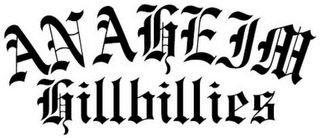The TTAB reversed a refusal based on the USPTO's requirement, under Section 6(a), that Applicant Red Flags Fly disclaim the word ANAHEIM in its mark ANAHEIM HILLBILLIES (Stylized) for various clothing items. The examining attorney maintained that ANAHEIM is primarily geographically descriptive of the goods. The Board, however, found no evidence that the goods will emanate from Anaheim, California (applicant is located in Los Angeles), and in any event, "the juxtaposition of ANAHEIM with HILLBILLIES creates an incongruity rendering Applicant's mark unitary." In re Red Flags Fly, Inc., Serial No. 87104371 (December 20, 2018) [not precedential] [not precedential] (Opinion by Judge Angela Lykos).

A term is primarily geographically descriptive if (1) its primary significance is a generally known geographic location; (2) the goods or services originate in the place identified in
the mark; and (3) purchasers would likely believe that the goods or services originate in the geographic place identified by the term. The Board concluded that "at a minimum the second prong of the test has not been met."
There was no evidence in the record that applicant's clothing products will originate from Anaheim, California. Because the application was filed under Section 1(b), there was no specimen of use that the Board could examine. The Board observed that proper Office procedure requires the examining attorney to either (1) contact the applicant to ascertain the origin of the goods and make a note to the file, or (2) issue an information request under Trademark Rule 2.61(b), 37 C.F.R. § 2.61(b). SeeTMEP Section 1210.03.
Moreover, the Board found that "the juxtaposition of ANAHEIM with HILLBILLIES creates an incongruity rendering Applicant's mark unitary."
The record shows that "Anaheim" is "a city outside Los Angeles, in Southern California. It's home to the Disneyland Resort, a massive complex of family-friendly, Disney-themed rides, restaurants, hotels and shops." According to MacMillan Dictionary, "hillbilly" is defined as "someone who lives in the countryside, especially someone who is not well educated." Consumers are well aware that Anaheim is not "the countryside," and therefore likely to perceive Applicant's mark as a sardonic reference to the city's populace and sprawling highly developed landscape. The intricate gothic stylization of the lettering in the mark creates another point of irony.
And so the Board reversed the refusal to register.
Read comments and post your comment here.
The content of this article is intended to provide a general guide to the subject matter. Specialist advice should be sought about your specific circumstances.

